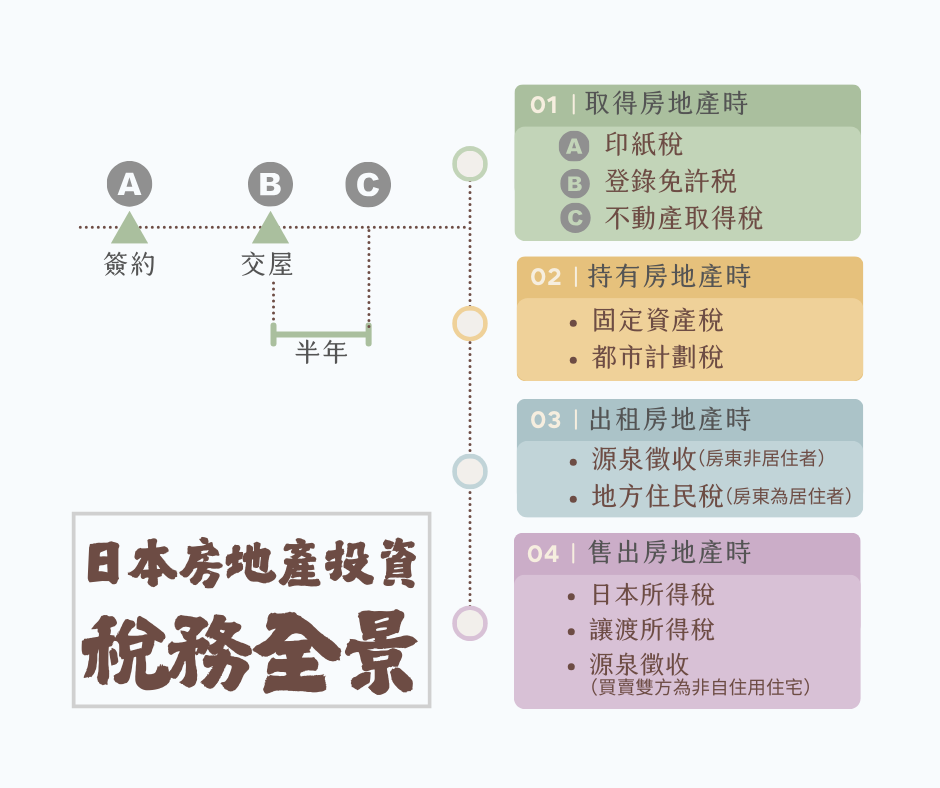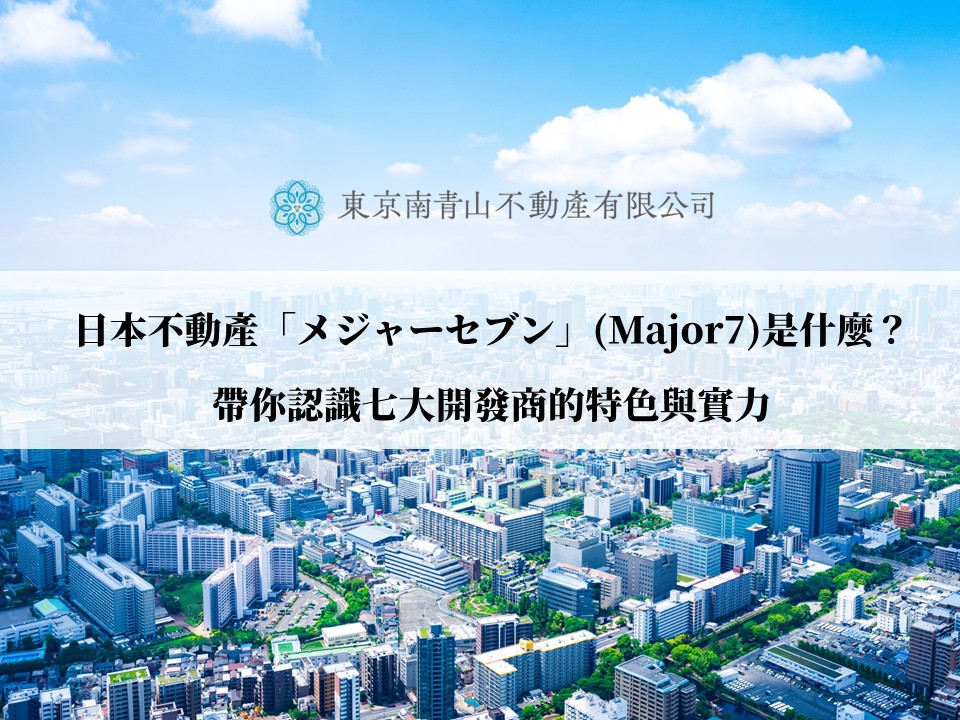When buying, investing in, or renting property in Japan, you're bound to encounter a wide range of specialized terms. Even with explanations from real estate agents, it's common to find yourself wondering, “What does this mean?”
Building on the foundational concepts introduced in Part 1, this installment dives deeper into real estate terminology related to taxation and legal matters. Our goal is to help overseas investors and landlords quickly understand the key points, avoid confusion, and minimize risks throughout the transaction and ownership process.
Taxation
► When Acquiring Real Estate
Real Estate Acquisition Tax: A one-time local tax assessed at 3%–4% of the fixed asset value.
Stamp Duty: Ranges from ¥5,000 to ¥48,000 depending on the contract amount; paid upon signing the sales agreement.
Registration and License Tax: Paid when applying for ownership transfer registration; typically around 2%, though reductions or exemptions may apply in certain cases.
▲ Brokerage fees and judicial scrivener fees (not taxes, but commonly incurred transaction costs)
► When Holding Real Estate
Fixed Asset Tax: Approximately 1.4% annually, based on the appraised value. Payment slips are issued by the municipal government every June.
Urban Planning Tax: Levied on properties located in urban areas. The rate is up to 0.3% per year (varies by municipality), and is collected together with the fixed asset tax.
▲ Management fees and repair reserve funds (not taxes, but typical ongoing costs): Common in condominiums, tower apartments, and high-rise buildings; charged monthly.
► When Renting Out Real Estate
Withholding Tax: If the landlord is a non-resident (i.e., has not lived in Japan for 183 consecutive days) and rents out Japanese property for commercial purposes, the tenant is required to withhold 20.42% of the rent and remit it as tax. The landlord can claim a full refund after filing an annual tax return.
Local Resident Tax: Generally, this tax (about 10%) is levied only on residents. Non-residents are usually exempt, but special cases should be confirmed with the local authorities.
► When Selling Real Estate
Japanese Income Tax: Taxed on net rental income using a progressive tax rate.
Capital Gains Tax (Transfer Income Tax):
Held for less than 5 years: 30% tax rate
Held for more than 5 years: 15% tax rate
Withholding Tax: When a non-resident (not living in Japan for 183 consecutive days) sells Japanese real estate, if both buyer and seller are not using the property as their primary residence, the buyer must withhold 10.21% of the transaction price and pay it to the tax office on behalf of the seller.
Stamp Duty: If a separate transfer contract is created, stamp duty must be paid again.

Further reading What is real estate acquisition tax? What is Property Tax and Urban Planning Tax?
Law/Contract
► Brokerage Agreement
When working with a real estate agency in Japan, the brokerage agreement you sign typically falls into one of the following categories:
Exclusive Brokerage Agreement: You may only appoint one real estate agent, and you are restricted from finding buyers independently.
Semi-Exclusive Brokerage Agreement: You are allowed to find a buyer on your own, but you may only appoint one real estate agent.
General Brokerage Agreement: You may appoint multiple real estate agents simultaneously and also search for buyers independently.
Important Notes
The “Important Notes” document, signed and explained by the real estate broker, details the property’s condition, rights and obligations, legal restrictions, and more. This document is essential for protecting the buyer’s rights and interests.
Common Disputes in Practice
1. Insufficient Disclosure of Defects or Restrictions
For example, if the property is located in a cultural heritage or landscape protection area with height restrictions for reconstruction, but this is not specified in the document. Or, if the property is in an aviation noise zone with frequent noise, but this is not disclosed.
Unregistered building extensions not mentioned in the documents can prevent the buyer from reconstructing or obtaining financing in the future.
2. Unclear Disclosure of Incidental Debts or Expenses
If necessary costs such as management fees or repair reserve funds are vaguely stated, the buyer may underestimate the ongoing ownership costs.
3. Incomplete Disclosure of Management Terms or Usage Restrictions
Restrictions such as no pets allowed, prohibition of private lodging, or parking spaces being assigned by lottery are not clearly indicated in the documents.
Tokyo Minami Aoyama Real Estate recommends:
Carefully check all details regarding taxes, usage restrictions, and lease succession before signing.
Consult with a real estate expert or lawyer familiar with Japanese property transactions to review the documents thoroughly.
► Building Management Rules
Resident Regulations & Common Misunderstandings
Resident regulations in apartments or buildings may include rules regarding pet ownership, interior renovation restrictions, and the use of shared facilities.
Common Misunderstandings Among Overseas Investors
Assuming Free Rental Use
Many investors discover after purchase that management rules prohibit short-term rentals, private lodging (including Airbnb), or office registration—directly impacting their intended use of the property.
Overlooking Renovation Restrictions
Some high-end apartments require prior approval from the management association for interior renovations. Restrictions on construction timeframes and methods can lead to delays and unexpected costs, especially if renovations are planned before renting out the property.

Summary
Compared to lease-related terms, matters involving buying, selling, taxation, and legal regulations have a longer-term impact. These not only affect the property's value and income potential but also play a critical role in safeguarding ownership rights. It is strongly recommended to consult with a professional to fully understand the meaning and implications of each term before signing any contract, in order to avoid costly misunderstandings.
Tokyo Minami Aoyama Real Estate specializes in property sales, design, construction, and leasing management in Tokyo’s Minato-ku, Aoyama, and Minami-Aoyama areas. With offices in Kaohsiung, Taiwan and Hong Kong, we have long served overseas investors and immigrants from over 50 countries. Our team is well-versed in cross-border transactions, tax planning, and legal compliance, offering comprehensive consulting and one-stop services tailored to the needs of international buyers.
▲ Contact us for exclusive property appraisals and expert consultation on legal and tax terminology—making your Japanese real estate investment safer and more secure.










